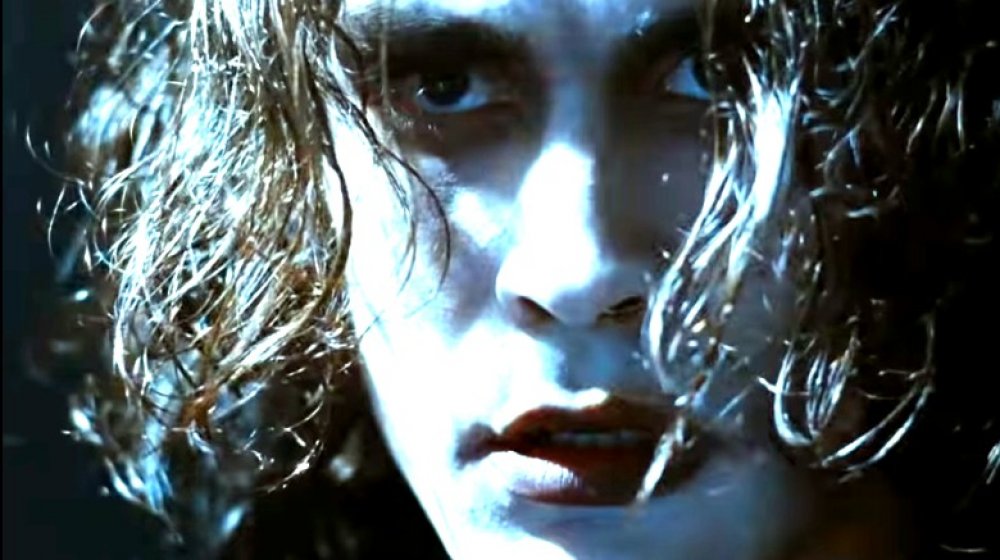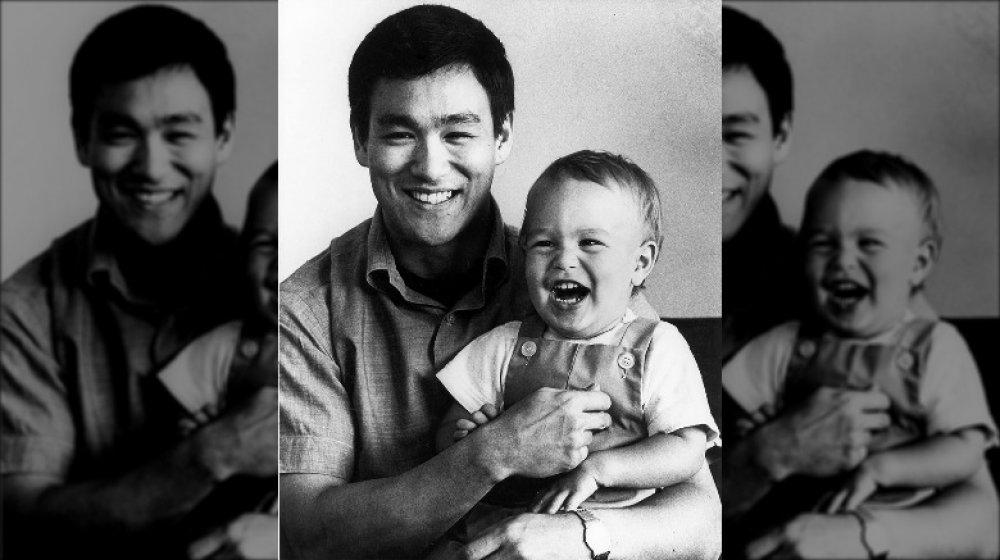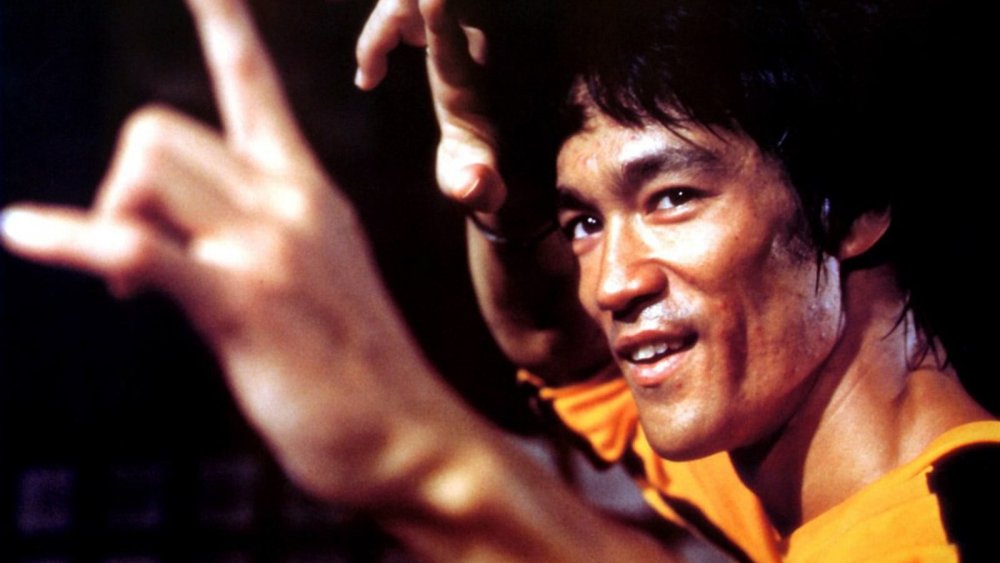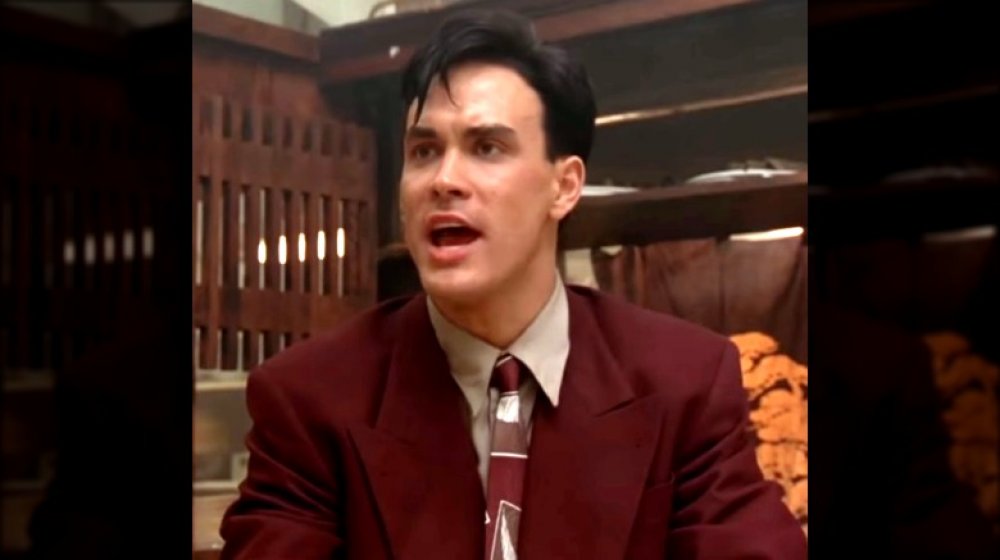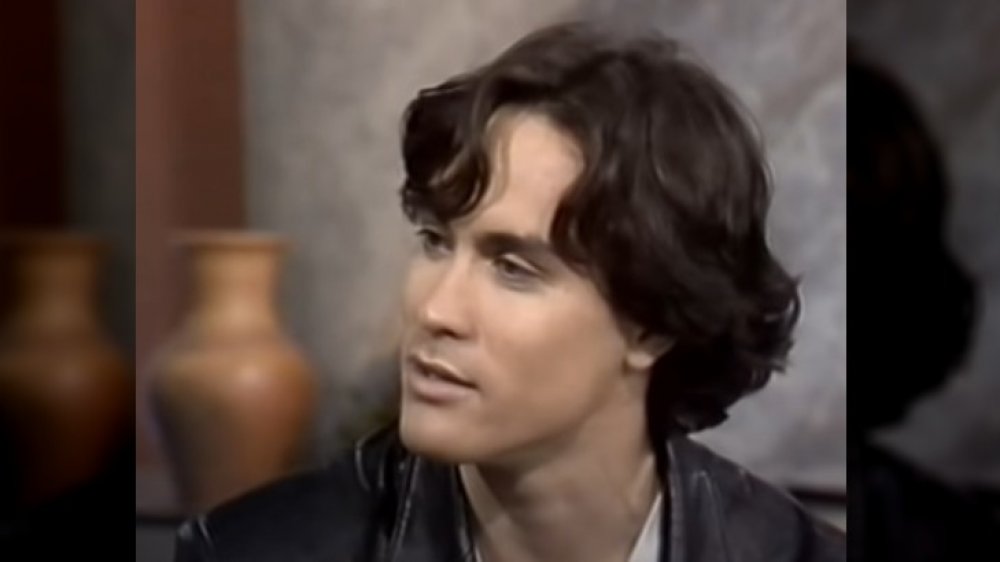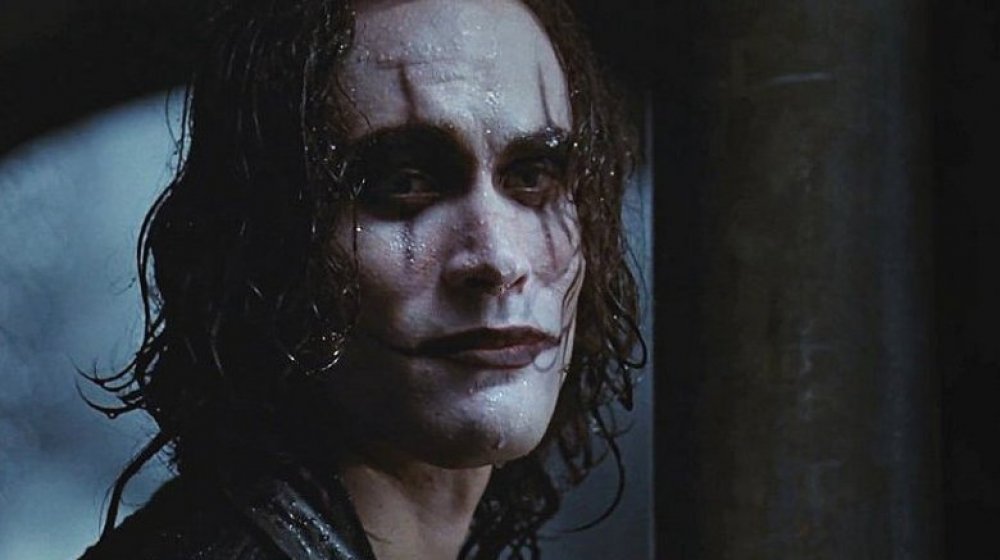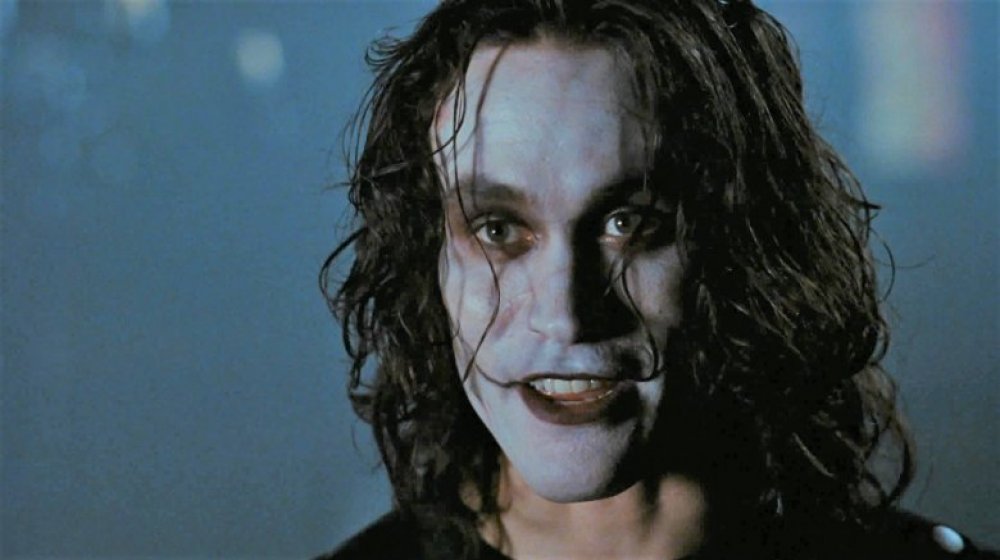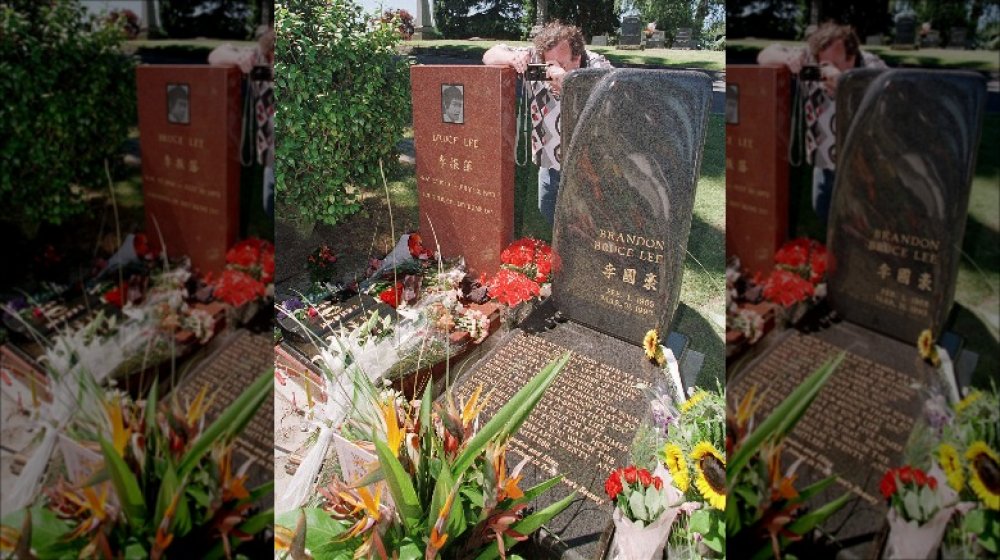The Tragic Death Of Bruce Lee's Son, Brandon Lee
Even if your knowledge of basic Hollywood lore is limited, you're probably somewhat familiar with the death of actor Brandon Lee, the son of martial arts icon Bruce Lee, on the set of the 1994 cult film The Crow. It's a real-life tragedy that plays out like a Hollywood crescendo, or a fateful example of how life can indeed imitate art.
Lee played Eric Draven, a poetic rock star whose death at the beginning of the film becomes the animus for his resurrection as the vengeful titular Crow. In one of the movie's last scenes, Draven was supposed to be shot to death. The gun used to shoot Lee during filming was supposed to be filled with blanks, but a real bullet was inadvertently fired from the revolver, striking Lee in the spine. The actor was rushed to the hospital and underwent surgery, but he succumbed to the injury on March 31, 1993, at the age of 28.
At first glance, this might seem like all there is to the story, but if you dig deeper, it becomes clear that the death of this action movie star only scratches the surface. Here's everything you never knew about the death (and life) of Brandon Lee.
Brandon Lee lived in Bruce Lee's shadow
Brandon Lee was only 8 years old when his father, Hong Kong-American action movie icon and martial arts visionary Bruce Lee, died of a cerebral edema at 32. While the elder Lee was renowned for his balletic style and acting abilities, his death at a young age solidified him as an almost mythic figure, and after Brandon decided to pursue his own acting career, his father's legacy was one he could never shake. Not only did it put Brandon inherently in competition with his father, whom he idolized, but it also complicated the mourning process.
According to an article published in the Chicago Tribune in April 1993, an incident that occurred when Brandon was only 9 years old demonstrates this complex dynamic. Brandon was planning to train with his father's martial arts protege, Don Inosanto, but during that meeting, the little boy reportedly "took one look at the wall photographs of his father...and burst into tears."
The Chicago Tribune also described Brandon's reaction to a movie poster for Showdown in Little Tokyo. Brandon co-starred in the film with actor Dolph Lundgren, but rather than crediting "Brandon Lee" on the poster, he was listed only as "the son of Bruce Lee." From that point on, the up-and-comer reportedly "refused any publicity linking him to his father."
Brandon Lee purportedly had a preoccupation with death
In a 2014 blog post on Medium written by Shannon Bradley-Colleary, a screenwriter who purportedly dated Brandon Lee before his sudden rise to fame, she alleges the actor was haunted by the legacy of Bruce Lee and that it manifested in harrowing ways.
According to Bradley-Colleary's recollections, Brandon "[romanticized] rising stars who flashed out in car crashes or overdosed on drugs, whose early and untimely deaths made them legends; his father being one of them." His alleged "fixation" on death served as a "leitmotif" — he rode a motorcycle (carelessly, as Bradley-Colleary describes), and supposedly even owned a hearse (which Brandon supposedly stated was "great for camping [trips]").
In his darker moments, he would allegedly watch a newsreel of his father's own funeral –Brandon supposedly had a VHS tape of the event. As Bradley-Colleary recounted, he allegedly told her he would die "younger than [his] dad did." Bradley-Colleary "[believed] wholeheartedly that Brandon sought Fame [sic] to step out from under his father's shadow and the price of Fame [sic] was his life," she said.
Brandon Lee hated being stereotyped by Hollywood
Despite proving his acting chops — first as a student at Emerson College in Boston, which is renowned for its acting program, and then at the Lee Strasberg Theatre and Film Institute in New York City — Brandon Lee continuously had to demonstrate his worth. It's notable that the majority of his career was populated with action roles that capitalized on his Asian heritage and his father's legacy (most notably Showdown in Little Tokyo, Rapid Fire, Kung Fu: The Movie, and the Hong Kong flick Legacy of Rage). Part of this was because of his father's reputation as an icon in the martial arts film genre, but another (arguably larger) part stemmed from something more insidious: Hollywood's habit of stereotyping and relegating people of color into cartoonish and often offensive representations.
In a 1993 Chicago Tribune article, Village Voice reporter Jeff Yang asserted that both Bruce and Brandon Lee had tried to deliver nuanced representations of Asians and Asian-Americans on the silver screen and to break barriers (especially those that desexualized and emasculated Asian men). "When we were growing up, it was great to have Bruce as a symbol of Asian-American prowess," Yang said. "Brandon was talented, sexy, and strong and had all these hopes attached to him."
For Brandon Lee, The Crow could have been a new beginning
In a 1992 Australian television interview on The Midday Show, Brandon Lee noted that he had only been cast in action roles but hoped to play "Hamlet, finally, one day" and be taken seriously as a dramatic actor.
Less than a year after that interview took place, The Crow seemed to be the answer to Brandon's prayers. The film was veiled as a superhero movie in an era in which superhero movies were typically considered fodder for schlocky laughs, but it was so much more than that. As the Independent put it in a 2016 retrospective of the film, "Lee believed in the material, and considered its frank exploration of grief and the revenge impulse brave, even transgressive." The Crow would be his watershed — his gateway into the serious roles he knew he could tackle, despite a world seemingly so desperate to tell him otherwise.
Unfortunately, what seemed to be a role of a lifetime — if anything, a lifeline — would grant him infamy, but at a terrible cost.
Was Brandon Lee the victim of a supposed Crow curse?
Brandon Lee's death on the set of The Crow generated rumors of yet another Hollywood curse. As detailed in the Independent, the basis of the comic strip the film was based on was, in the end, almost an eerie portent to Lee's eventual passing.
Crow creator and graphic novelist James O'Barr reportedly conceived the strip after his fiancée was killed by a drunk driver. As O'Barr relayed in 2016, The Crow was a product of "[feeling] there was nothing in my future but nothingness and I was angry and furious...I carried that around for a few years until it became almost poisonous and I needed to do something."
O'Barr's own traumatic past was the first panel in what ultimately became a triptych of surreal coincidences. The Crow's plot hinged on the death of protagonist Eric Draven's fiancée, and in real life, Lee was planning to marry Eliza Hutton two weeks after production wrapped. Even though one of the aforementioned engagements was fictional, The Crow essentially left three people bereaved before its release.
Brandon Lee's death wasn't the only traumatic incident during The Crow
In addition to Brandon Lee's death during filming, a number of freak occurrences plagued the cast and crew throughout the film's production. According to the Independent, an electrician drove into a pylon on the first day of shooting and almost died on the set; a carpenter stabbed a screwdriver into his hand; a crewmember drove a car into the props workshop; and a "freak storm" reportedly cost the filmmakers "thousands of dollars worth of damage" during filming. All of this happened prior to the tragedy that many consider inextricable with the legacy of The Crow: the death of its star.
Some might argue, however, that the last victim The Crow curse was the man who fired the gun that killed Lee: actor Michael Massee, who died of stomach cancer in 2016 at age 64. Massee was a journeyman character actor whose credits include television show 24 and The Amazing Spider-man. He was never charged in relation to the accident (Police conducted an investigation to rule out foul play), but he was haunted by the tragedy nonetheless.
Despite his early death, Brandon Lee's legacy continues
Though Brandon Lee's death on the set of The Crow has become an allegory of potential unrealized, his life's work was not in vain. As a number of academics have noted (via Beyond Bruce Lee), Brandon's brief stardom "promised the possibility of [acceptance in the mainstream] as he began to make inroads in the racist film industry." Without the work of both Brandon and his father, Bruce Lee, Asian representation in film would arguably not be what it is today. The overwhelming commercial and critical success of the 2018 rom-com Crazy Rich Asians, and the rising prominence of Asian and Asian-American actors in leading roles suggests that Brandon's vision is gradually materializing within the entertainment industry.
It's undeniable that Brandon Lee was taken from us far too soon, but in the end, we're thankful for the work he made, the art he lived for, and the ways in which his legacy lives on. In the end, he is so much more than the way he died or another version of a Hollywood urban legend — if we should remember anything, it should be the way he lived.

